 Leading a busy life can sometimes lead you to forget just how important it is to take good care of your teeth. But the fact is that many of the activities that you take for granted depend on you having a healthy mouth. If you contract gum disease or start experiencing dental decay then eating, drinking and even talking can be rendered much more difficult. So it is best to take care of your mouth in the way that dentists advise.
Leading a busy life can sometimes lead you to forget just how important it is to take good care of your teeth. But the fact is that many of the activities that you take for granted depend on you having a healthy mouth. If you contract gum disease or start experiencing dental decay then eating, drinking and even talking can be rendered much more difficult. So it is best to take care of your mouth in the way that dentists advise.
First of all, you should be brushing your teeth at least twice a day to remove the plaque which is a major cause of tooth decay and gum disease. You ought to brush for about three minutes and make sure that you are covering all the areas of your mouth from front to back and top to bottom. As well as brushing you should floss as well to remove the plaque which forms in between your teeth.
All food causes plaque to some degree but sugary and starchy foods produce the most and you should restrict yourself in how much of these foods you eat. Sometimes you might wish to brush your teeth after you’ve had a sugary snack or a starchy meal. Activities such as smoking tobacco and drinking a lot of alcohol can have a detrimental effect on your oral hygiene too and are leading causes of oral cancer.
All of these measures should be done in conjunction with regular visits to your dentist so that your oral health can be monitored by a professional. Dentists can spot the signs of any problems early on and offer effective diagnosis before the problem gets too bad. Talk to your Leeds dentist if you need more advice about these matters.





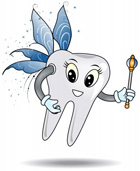 As part of taking care of your teeth, some people turn to mouth washes. But the picture is not that clear as to how beneficial they actually are. If you want some answers about mouth washes and whether they are the best choice for you then you should read on.
As part of taking care of your teeth, some people turn to mouth washes. But the picture is not that clear as to how beneficial they actually are. If you want some answers about mouth washes and whether they are the best choice for you then you should read on. There are many decisions to be made when considering how best to take care of your mouth such as what type of brush to use and which, of the many, tooth pastes. One of the decisions that people have wrestled with over the years concerns fluoride and it is not without controversy. Read on for more information.
There are many decisions to be made when considering how best to take care of your mouth such as what type of brush to use and which, of the many, tooth pastes. One of the decisions that people have wrestled with over the years concerns fluoride and it is not without controversy. Read on for more information.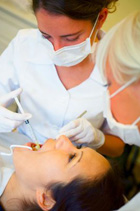 Even the most rigorous and careful brushing at home cannot reproduce that feeling of having had your teeth cleaned by the dentist. They use special equipment that will leave your teeth feeling incredible clean and help to maintain your oral health.
Even the most rigorous and careful brushing at home cannot reproduce that feeling of having had your teeth cleaned by the dentist. They use special equipment that will leave your teeth feeling incredible clean and help to maintain your oral health. There are a number of simple ways in which you can take the best possible care of your mouth though. The first and most important in many ways is that you brush your teeth at least twice a day and again after meals if you feel it is necessary. This is so that plaque does not build up and cause your teeth to start decaying. You ought to brush for about three minute, making sure that you are covering all the areas of your mouth.
There are a number of simple ways in which you can take the best possible care of your mouth though. The first and most important in many ways is that you brush your teeth at least twice a day and again after meals if you feel it is necessary. This is so that plaque does not build up and cause your teeth to start decaying. You ought to brush for about three minute, making sure that you are covering all the areas of your mouth.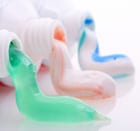 When it comes to buying toothpaste in Leeds, you’d have probably noticed that there is a lot to choose from- there are powders, pastes and gels and you may have to experiment at first to get one that suits you. And if you have a family of course, you have to take into consideration their needs too. Generally, most pastes come with certain ingredients already added. Calcium carbonate is used as an abrasive that aid the removal of bacteria and stains. All will contain some form of flavouring, thickeners and detergents, but the most important ingredient that toothpaste should have, and is widely supported by dentists, is fluoride. This natural mineral has proven to be quite a deterrent over the years to plaque and tooth decay. It enhances saliva and hardens (and enriches) the tooth’s enamel- although caution should be taken when children are involved. Once you are happy with all these, there are a few other matters to consider. Some toothpaste will include some form of tartar control, very important if you are prone to it. If you have sensitive teeth, there are products out there designed specifically to overcome this problem. Finally, for those of us that seek the Hollywood touch, there are pastes, gels and powders that contain a whitening agent to keep your teeth ‘pearly white’- a smokers’ choice too. If you are still unsure, you can always ask your dentist- they know as much about your teeth as you.
When it comes to buying toothpaste in Leeds, you’d have probably noticed that there is a lot to choose from- there are powders, pastes and gels and you may have to experiment at first to get one that suits you. And if you have a family of course, you have to take into consideration their needs too. Generally, most pastes come with certain ingredients already added. Calcium carbonate is used as an abrasive that aid the removal of bacteria and stains. All will contain some form of flavouring, thickeners and detergents, but the most important ingredient that toothpaste should have, and is widely supported by dentists, is fluoride. This natural mineral has proven to be quite a deterrent over the years to plaque and tooth decay. It enhances saliva and hardens (and enriches) the tooth’s enamel- although caution should be taken when children are involved. Once you are happy with all these, there are a few other matters to consider. Some toothpaste will include some form of tartar control, very important if you are prone to it. If you have sensitive teeth, there are products out there designed specifically to overcome this problem. Finally, for those of us that seek the Hollywood touch, there are pastes, gels and powders that contain a whitening agent to keep your teeth ‘pearly white’- a smokers’ choice too. If you are still unsure, you can always ask your dentist- they know as much about your teeth as you.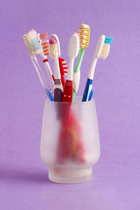 In the ongoing rush to keep our teeth clean in central Leeds, it should always be remembered that it all starts with a good toothbrush and choosing the right type that suits you can be a bit of a minefield. There are so many shapes and sizes, hard bristles, soft bristles, angled brushes- and then you can move into the world of electric brushes and as fantastic as they are in their cleaning actions, some may be very abrasive and completely unsuitable for your mouth. It can be a matter of trial and error until you get this right, as all our mouths tend to be different, with different agendas and requirements; it’s not a good idea, for example to continue brushing with the same brush if it is making your gums bleed. The best person to ask advice on this subject is your dentist. They have seen more of the inside of your mouth than you; they know how delicate your gums are and how your teeth are angled and can point you in the right direction. One thing is for sure, you should change your brush regularly- they wear down and then work inefficiently, and they are a great home for bacteria. If you persevere with your search for the right brush and keep a few rules in mind, you should have no problems with cleaning your teeth.
In the ongoing rush to keep our teeth clean in central Leeds, it should always be remembered that it all starts with a good toothbrush and choosing the right type that suits you can be a bit of a minefield. There are so many shapes and sizes, hard bristles, soft bristles, angled brushes- and then you can move into the world of electric brushes and as fantastic as they are in their cleaning actions, some may be very abrasive and completely unsuitable for your mouth. It can be a matter of trial and error until you get this right, as all our mouths tend to be different, with different agendas and requirements; it’s not a good idea, for example to continue brushing with the same brush if it is making your gums bleed. The best person to ask advice on this subject is your dentist. They have seen more of the inside of your mouth than you; they know how delicate your gums are and how your teeth are angled and can point you in the right direction. One thing is for sure, you should change your brush regularly- they wear down and then work inefficiently, and they are a great home for bacteria. If you persevere with your search for the right brush and keep a few rules in mind, you should have no problems with cleaning your teeth. It’s probably safe to assume that most of us know how to keep our teeth clean in the city of Leeds, but it’s also a fact that, cases of people suffering from tooth decay, throughout the country, is on the increase. If you want to keep your teeth healthy, it’s essential to maintain a program of good oral hygiene and if your have any doubts about this, you should consult your dentist. The basic principles have never been in doubt- clean, twice daily with a suitable brush and a fluoride based toothpaste, rinsing and flossing after eating, and a bi-annual dental check-up. But this is only scratching the surface of keeping your teeth clean. It’s also important to understand what we are putting in our mouths- some foods are acidic and sugar based, and are the main causes of tooth decay. It’s important to make sure these foods are removed from mouth correctly. Small brushes, flossing, dental gum and mouthwashes are a great source of back-up to the general cleaning process and are always useful to have at your disposal- especially as we get older and gaps appear between the teeth. As well as all these tips, it is also handy to remember that over cleaning can be detrimental to teeth and should be cleaned in moderation Once you have mastered a technique and regime that suits you, you shouldn’t have a problem keeping your teeth clean.
It’s probably safe to assume that most of us know how to keep our teeth clean in the city of Leeds, but it’s also a fact that, cases of people suffering from tooth decay, throughout the country, is on the increase. If you want to keep your teeth healthy, it’s essential to maintain a program of good oral hygiene and if your have any doubts about this, you should consult your dentist. The basic principles have never been in doubt- clean, twice daily with a suitable brush and a fluoride based toothpaste, rinsing and flossing after eating, and a bi-annual dental check-up. But this is only scratching the surface of keeping your teeth clean. It’s also important to understand what we are putting in our mouths- some foods are acidic and sugar based, and are the main causes of tooth decay. It’s important to make sure these foods are removed from mouth correctly. Small brushes, flossing, dental gum and mouthwashes are a great source of back-up to the general cleaning process and are always useful to have at your disposal- especially as we get older and gaps appear between the teeth. As well as all these tips, it is also handy to remember that over cleaning can be detrimental to teeth and should be cleaned in moderation Once you have mastered a technique and regime that suits you, you shouldn’t have a problem keeping your teeth clean.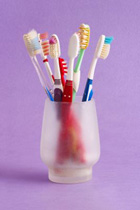 It is important that tooth brushing, which ought to be protecting your teeth is not damaging them. This can happen if you are brushing too vigorously and you might want to choose a brush with softer bristles so that brushing doesn’t make your gums bleed and compromise your enamel.
It is important that tooth brushing, which ought to be protecting your teeth is not damaging them. This can happen if you are brushing too vigorously and you might want to choose a brush with softer bristles so that brushing doesn’t make your gums bleed and compromise your enamel.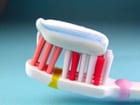 In taking care of your teeth you face many dilemmas such as the strength of the bristles you choose for your brush and whether you ought to use dental floss or dental tape. Another issue that many people wrestle with is that of fluoride and whether it is helpful to use it to aid in the fight against plaque.
In taking care of your teeth you face many dilemmas such as the strength of the bristles you choose for your brush and whether you ought to use dental floss or dental tape. Another issue that many people wrestle with is that of fluoride and whether it is helpful to use it to aid in the fight against plaque.

